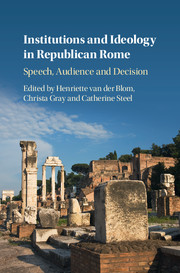Book contents
- Institutions and Ideology in Republican Rome
- Institutions and Ideology in Republican Rome
- Copyright page
- Dedication
- Contents
- Contributors
- Acknowledgements
- Abbreviations
- Introduction
- Part I Modes of Political Communication
- Chapter 1 Aristocratic Dignity and Indignity in Republican Public Life
- Chapter 2 Political Communication in the Late Roman Republic
- Chapter 3 Political Participation and the Identification of Politicians in the Late Roman Republic
- Chapter 4 Gods, Change and Civic Space in Late Republican Oratory
- Part II Political Alliances
- Part III Institutions in Theory and Practice
- Part IV Memory and Reputation
- Bibliography
- Index
Chapter 4 - Gods, Change and Civic Space in Late Republican Oratory
from Part I - Modes of Political Communication
Published online by Cambridge University Press: 08 May 2018
- Institutions and Ideology in Republican Rome
- Institutions and Ideology in Republican Rome
- Copyright page
- Dedication
- Contents
- Contributors
- Acknowledgements
- Abbreviations
- Introduction
- Part I Modes of Political Communication
- Chapter 1 Aristocratic Dignity and Indignity in Republican Public Life
- Chapter 2 Political Communication in the Late Roman Republic
- Chapter 3 Political Participation and the Identification of Politicians in the Late Roman Republic
- Chapter 4 Gods, Change and Civic Space in Late Republican Oratory
- Part II Political Alliances
- Part III Institutions in Theory and Practice
- Part IV Memory and Reputation
- Bibliography
- Index
Summary
- Type
- Chapter
- Information
- Institutions and Ideology in Republican RomeSpeech, Audience and Decision, pp. 88 - 104Publisher: Cambridge University PressPrint publication year: 2018



